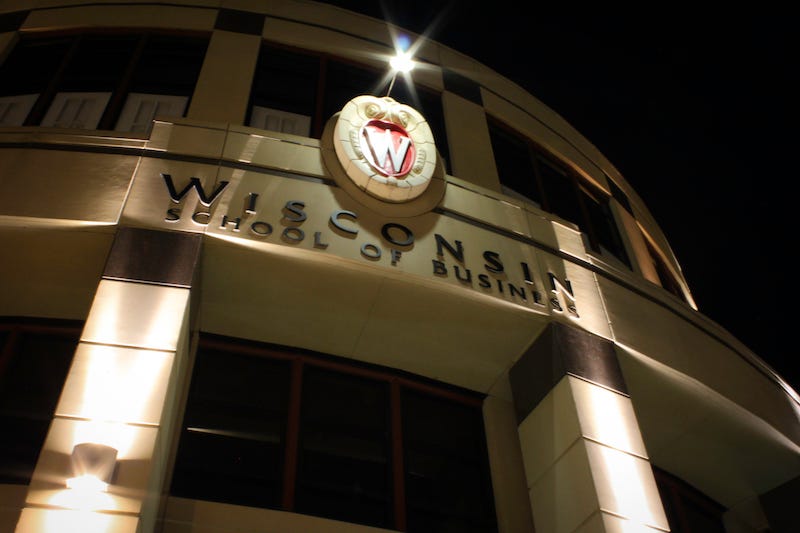By Yingchong Liu

Engineers learn a lot about science and math to solve grand challenges; however, their work does not always stop there. Engineers may also be required to talk and think in business languages. Thus, a lack of business skills sets may slow their career development. In order to broaden their career potential, pursuing an MBA (Masters of Business Administration) is a great way to help them out. Unfortunately, engineers often find it quite difficult to find spare time after busy work and full curriculum study. The UW-Madison Evening and Executive MBA programs offer solutions to both problems for Badger engineers.
There are three branches within the UW-Madison MBA program: Full-Time, Evening (part-time), and Executive. The Evening and Executive MBA programs are more suitable for engineers who have full-time jobs and studies. The Evening MBA program is a 30-month program for part-time students to learn business skill sets on every Monday and Thursday evening. The Executive MBA program focuses more on engineers with leadership experience in the industry and meets on every other Fridays and Saturdays for 20 months. Both programs open new gates for engineers by introducing business and financial knowledge and providing a foundation in cross-functional management.
Many titles and honors have been awarded to the UW-Madison MBA programs. The UW-Madison Evening MBA program ranked the #13 among public universities for part-time MBA programs in the “Best Grad Schools — Business 2017” category in U.S. News & World Report. The Executive MBA program ranked #15 among US public executive programs according to The Economist in 2015. There are many aspects that make the UW-Madison MBA programs some of the best among public schools in America.
For both Evening and Executive MBA programs, students are part of the same cohort of students or the whole program. Students build a social network and gain knowledge from different areas. According to Jean Sink, Director of Recruiting and Admissions for the Evening& Executive MBA Programs, “One third of our students come from the engineering, sciences, and technology sector. One third come from business, and the balance from government, non-profit, and military sectors.” A variety of people will give in-depth views from different industries. “In the UW-Madison Evening MBA program, we had a cohort of close to 50 people that went through the program together. Not only did I learn a lot from the professors, but I was able to learn from all my fellow classmates with a wide range of skills and backgrounds,” describes Kelsey Johnson, Evening MBA Class of 2015. Johnson is an engineer who currently works at GE Healthcare in the Global Supply Chain.
While juggling classes with work or other studies can be stressful, it gives students opportunities to apply what they learn into the real world pretty fast. “Our evening students say what they learn on Monday and Thursday evening, they go right back on Tuesday and Friday and apply” Sink says, “And our executives are here every other Friday and Saturday. So when they go back [to work] that following Monday, they are putting into practice what they have just been studying in the classroom.”
Another element that makes the UW-Madison MBA program so special is the great consideration for students from the program stuff Sink gave examples of how the student services and academic resources staff give students from both programs support, “We secure parking passes for our students. We arrange for the food, the meals and the refreshments while they are here on campus. We secure their packets for class so our students don’t have to stand in the line at the copy center.” Saving time by doing those small pieces allow students to focus more on their studies and work. Furthermore, students also have access to career services, like career self-assessment, branding and social media management, résumé and cover letter preparation, company and industry research, and much more.
Sink explains that engineers choose the UW-Madison MBA program because it provides increased advancement opportunities in a wide variety of careers. “Engineers in either program may come with bachelors, masters, or even a PhD in engineering. They return for an Evening or Executive MBA to grow their careers and recognize the critical need to gain business acumen,” Sink says. “Their trajectory has changed for their career.” The UW-Madison MBA students agree that the program is giving them tangible skills that help them to enrich their careers. “The MBA allowed me to successfully transition from technical project leader to sales operations leader in my organization,” says Rafael Nuñez, an Executive MBA Class of 2014 graduate. “The MBA has complemented my engineering skills with business acumen and tools that help me focus on critical and strategic aspects of my work.”
The UW-Madison MBA may sound like a good choice for you now. Or perhaps you still have many questions about your future. “I believe that the decision to pursue an MBA as an engineer comes down to where you want to go with your career, and should align with your interests and strengths,” says Jack Page, an Evening MBA Class of 2015 graduate. If you are considering pursuing a supplemental business education, the MBA program admission professions can provide advice about the admission process to help you decide whether the Evening or Executive MBA program is the best fit for you.
Plenty of resources are available around UW-Madison campus for engineers to explore and be successful in a new career path. The UW-Madison Executive and Evening MBA programs allow engineers to enrich their careers. If you are interested in either of these programs, there are many information sessions available for you to explore each month. Please visit 2339 Grainger Hall, 975 University Ave, , or https://bus.wisc.edu/executive-mba for more information.
